 Being honest is one of the hardest things, and it’s no different when it comes to how people see themselves once they buy a decent camera. A lot of times, folks will buy a good Nikon or Canon DSLR and automatically label themselves as the new photographers in town. This is not an article on human flaws, so I won’t go there. I will however point out six harsh truths about people who think they are photographers, for a number of reasons, none of them being serious. I don’t intend to offend anyone, so please don’t look at this article as harsh criticism. None of us are born with the skill, and I believe we all have to keep learning for as long as we live and work, regardless of level. I just want to point out some of the ways to tell if you, in the general acceptance, a real photographer or not.
Being honest is one of the hardest things, and it’s no different when it comes to how people see themselves once they buy a decent camera. A lot of times, folks will buy a good Nikon or Canon DSLR and automatically label themselves as the new photographers in town. This is not an article on human flaws, so I won’t go there. I will however point out six harsh truths about people who think they are photographers, for a number of reasons, none of them being serious. I don’t intend to offend anyone, so please don’t look at this article as harsh criticism. None of us are born with the skill, and I believe we all have to keep learning for as long as we live and work, regardless of level. I just want to point out some of the ways to tell if you, in the general acceptance, a real photographer or not.
-
Your website says you are a photographer
Having a website today is a necessity, not an achievement. You might not have an established name yet, but you also don’t need people to read “photographer” next to your name, written in large fonts. Find a more subtle way of promoting yourself or your business and remember, it’s the photos that should do the talking.
-
Your biggest fans are your family
There is absolutely nothing wrong with your family and friends liking your work. After all, appreciation should come from anyone, not just art critics or people in the field. The only real problem is when your only fans are family and friends. Don’t expect your mom and dad to tell you that you did a poor job, because they probably won’t. Even if you fail, you’ll probably still be appreciated. For honest opinions, turn to people who don’t know you personally.
-
Your camera is big
It’s one of the classic rookie mistakes. People buy the bigger camera because they feel, for some strange, unknown reason, that it will take better pictures. I won’t even start on why that’s a wrong approach. Just get the entry level model. You’ll be fine.
-
You never use anything else but Auto mode
Ah, shooting in the green. Who among us has not done it? It’s perfectly normal, especially when you’re just learning how the camera works. Just don’t stay there too long. Shooting on full automatic mode will never help you learn or fully understand how exposure works. All cameras are made the same, despite the brand, the looks or the feel. The principles are the same and the way to learn them is by exposing manually.
-
You work for free
I can see how this will upset some serious amateurs. Well, if you plan on staying an amateur forever, which is absolutely fine, there’s nothing wrong with this. Just don’t call yourself a pro photographer. Beside the skills required to earn this name, you must also put food on the table with that camera. It’s just the way things go. If you’re shooting for free, you’re an amateur, a beginner or a fine artist. You’re not a pro photographer.
-
You shoot only in available light
Many pros shoot only in available light, and that’s just fine, that’s how they make their work great. But they do it because they chose to, not because they don’t know any different Rookies boost the ISO and buy fast lenses because to them, ambient light is the only way to go. That’s because few things scare them more than using a flash off camera or walking into a studio full of strobes. A pro should master light, regardless of what the source is.
Also Read: THE 19 MOST EXPENSIVE PHOTOGRAPHS EVER SOLD
Recommended Reading:
- 2013 Photographer's Market: The Most Trusted Guide to Selling Your Photography
- How to Create Stunning Digital Photography
- Best Business Practices for Photographers
- The Fast Track Photographer Business Plan: Build a Successful Photography Venture from the Ground Up
- Group Portrait Photography Handbook
- 500 Poses for Photographing Women
- The Best of Family Portrait Photography: Professional Techniques and Images
- 500 Poses for Photographing Group Portraits
- Selling Your Photography: How to Make Money in New and Traditional Markets
- Starting Your Career as a Freelance Photographer
- Photographer's Survival Manual: A Legal Guide for Artists in the Digital Age
- Legal Handbook for Photographers: The Rights and Liabilities of Making Images
- Taking Stock: Make money in microstock creating photos that sell
- Going Pro: How to Make the Leap from Aspiring to Professional Photographer
Image credit: lenta / 123RF Stock Photo
